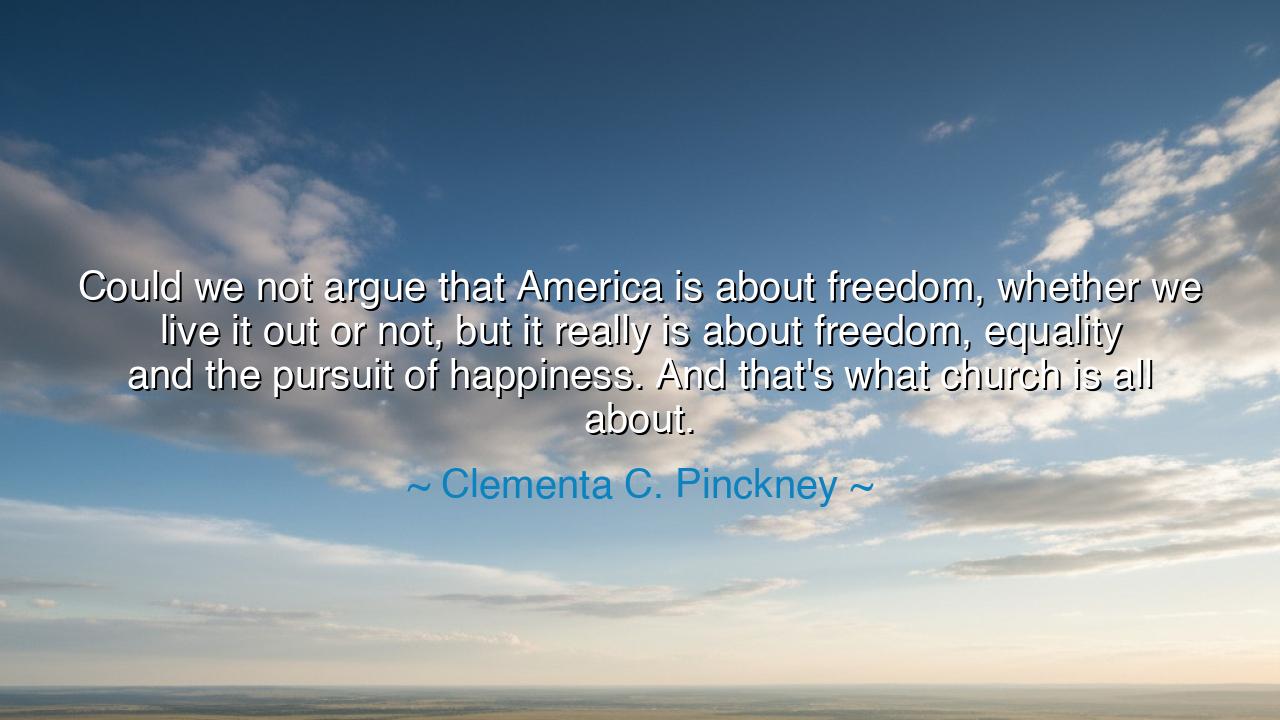
Could we not argue that America is about freedom, whether we live
Could we not argue that America is about freedom, whether we live it out or not, but it really is about freedom, equality and the pursuit of happiness. And that's what church is all about.






In the words of Clementa C. Pinckney, “Could we not argue that America is about freedom, whether we live it out or not, but it really is about freedom, equality and the pursuit of happiness. And that’s what church is all about.” These words shine like a beacon, spoken by a man of faith and justice who gave his life in service to his people. They are not merely a reflection on ideals, but a declaration that the nation’s founding promises and the sacred work of the church spring from the same well: the dignity of every soul and the hope that humanity can rise beyond its divisions.
Pinckney, a pastor and legislator, spoke these words from the pulpit of history. He saw that America was not perfect in practice, but radiant in principle. Freedom, equality, and the pursuit of happiness are the great triad inscribed in the Declaration of Independence, ideals meant to lift a nation above tyranny and oppression. Yet he also knew the truth: these promises had often been denied, withheld from African Americans, from the poor, from the marginalized. Still, he dared to say, “that’s what America is about.” For to proclaim the ideal, even when it is not yet fully lived, is to keep alive the vision that can one day be realized.
And here Pinckney drew the sacred parallel: “that’s what church is all about.” For the church, too, is built upon promises not always lived out. It proclaims love, yet has sometimes practiced exclusion. It teaches forgiveness, yet has seen hatred within its walls. Still, at its heart, the church is about lifting souls into freedom, reminding each person of their worth in the sight of God, and gathering communities around the eternal truths of equality and compassion. Just as America struggles to embody its founding creed, so does the church labor to embody its divine calling.
History offers us a powerful example of this harmony between nation and church. During the Civil Rights Movement, African American churches became the beating heart of freedom. In sanctuaries across the South, men and women gathered to sing, to pray, and to prepare themselves for the trials of marches, boycotts, and jail cells. The church gave them courage, and the ideals of America gave them language. Martin Luther King Jr. preached that the Constitution and the Bible together demanded equality. The people marched with hymns on their lips and the words of the Declaration in their hearts. Thus, the two institutions, flawed but hopeful, intertwined in the struggle for justice.
Pinckney himself stood as a bridge between these realms. As both pastor and public servant, he embodied the truth that freedom, equality, and the pursuit of happiness are not separate from the life of faith. They are sacred duties, entrusted to us by both God and history. His own death in the Charleston church shooting of 2015 became a martyrdom, a tragic yet radiant reminder that hatred still seeks to destroy, but also that the ideals of America and the mission of the church remain stronger than violence. His words echo as a prophecy: that freedom and equality are not luxuries but necessities, woven into both civic and spiritual life.
The lesson for us is this: do not separate your highest ideals from your daily practice. Whether in the halls of government or in the pews of a church, freedom and equality must guide your actions. Do not dismiss ideals because they are not yet fully lived. Instead, proclaim them louder, work for them harder, and embody them in your own life, until the gap between promise and practice is closed.
Practical actions follow from this wisdom. Live out freedom by defending the rights of others, even those unlike yourself. Honor equality by treating every soul as worthy of respect, in home, work, and community. Seek happiness not in selfish pleasure, but in shared flourishing, building spaces where others can thrive. And above all, let your civic and spiritual life be united, so that your actions in society and your faith in the sacred are not divided but joined in harmony.
Thus, Clementa C. Pinckney’s words endure as both challenge and comfort. They remind us that America and the church are bound together by a common call: to lift humanity toward its noblest heights, to shelter the weary, to honor the equal worth of every soul, and to guard the flame of freedom even in the darkest night. Let us pass this wisdom forward: that though ideals may falter, they remain eternal—and it is our sacred duty to live them out with courage and hope.






AAdministratorAdministrator
Welcome, honored guests. Please leave a comment, we will respond soon